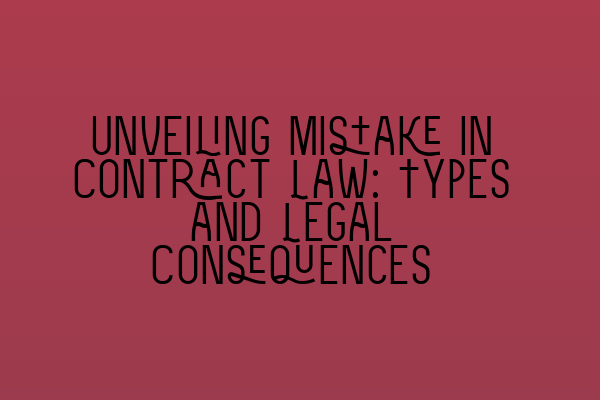Unveiling Mistake in Contract Law: Types and Legal Consequences
Introduction:
Contract law serves as the backbone of the business world, governing agreements and ensuring that both parties fulfill their obligations. However, contracts are not immune to errors and mistakes. These errors, known as mistakes in contract law, can have significant legal consequences. In this blog post, we will delve into the types of mistakes that can occur in contracts and the legal implications that follow.
Types of Mistakes in Contract Law:
1. Mutual Mistake:
A mutual mistake arises when both parties to a contract share a fundamental misunderstanding about a material fact. This mistake can render the contract voidable, meaning that either party can request rescission or cancellation of the agreement. For instance, if two parties enter into a contract to sell a plot of land, unaware that a major highway will be constructed in the vicinity, they may seek to void the contract due to the mutual mistake.
2. Unilateral Mistake:
Unlike a mutual mistake, a unilateral mistake occurs when only one party is mistaken about a material fact. In most cases, a unilateral mistake does not provide sufficient grounds for rescission, as the mistaken party is expected to bear the consequences of their own error. However, there are exceptions to this rule. If the other party knew or should have known about the mistake and unfairly took advantage of it, the contract may become voidable.
3. Mistake as to Identity:
Mistake as to identity, also known as misrepresentation, occurs when one party mistakenly believes they are entering into a contract with a specific individual or entity. If the mistaken party would not have entered into the contract had they known the true identity, they may seek to void the agreement. It is crucial to establish the intention of the parties and whether the mistake directly affects the performance of the contract.
Legal Consequences:
1. Rescission:
Rescission is the legal remedy available to the party seeking to cancel or undo a contract due to a mistake. If a court grants rescission, the contract will be treated as if it never existed, and both parties will be restored to their pre-contractual positions. The mistaken party must act promptly to seek rescission, as unreasonably delayed requests may be rejected.
2. Damages:
In certain cases, a party may be entitled to claim damages instead of seeking rescission. This occurs when rescission is not possible or not the preferable remedy. The party seeking damages must prove that they suffered a loss as a direct result of the mistake, and the damages awarded will aim to compensate for that loss.
3. Reformation:
Reformation is a remedy available to the court in cases where a mistake in the written contract does not accurately reflect the true intentions of the parties. The court has the authority to revise or rewrite the contract to align it with the original intentions, thus rectifying the mistake.
Conclusion:
Mistakes in contract law can have significant legal consequences, from making a contract voidable to providing grounds for rescission, damages, or reformation. It is crucial for solicitors and legal professionals to navigate contracts with precision and diligence to avoid or mitigate the impact of any mistakes. By remaining aware of the various types of mistakes and their legal implications, solicitors can better protect their clients’ interests and ensure the enforceability of contracts.
If you enjoyed this article, we recommend checking out these related articles:
– [Navigating Legal Challenges and Pitfalls in Your Practice](https://become-solicitor-sra.co.uk/navigating-legal-challenges-and-pitfalls-in-your-practice/)
– [Ethical Responsibilities of Solicitors: Upholding Professionalism](https://become-solicitor-sra.co.uk/ethical-responsibilities-of-solicitors-upholding-professionalism/)
– [Barrister vs. Solicitor: A Comprehensive Comparison](https://become-solicitor-sra.co.uk/barrister-vs-solicitor-a-comprehensive-comparison/)
– [Understanding the SRA Competence Statement: A Guide for Solicitors](https://become-solicitor-sra.co.uk/understanding-the-sra-competence-statement-a-guide-for-solicitors-2/)
– [Networking for Solicitors: Strategies for Building a Strong Network](https://become-solicitor-sra.co.uk/networking-for-solicitors-strategies-for-building-a-strong-network/)
